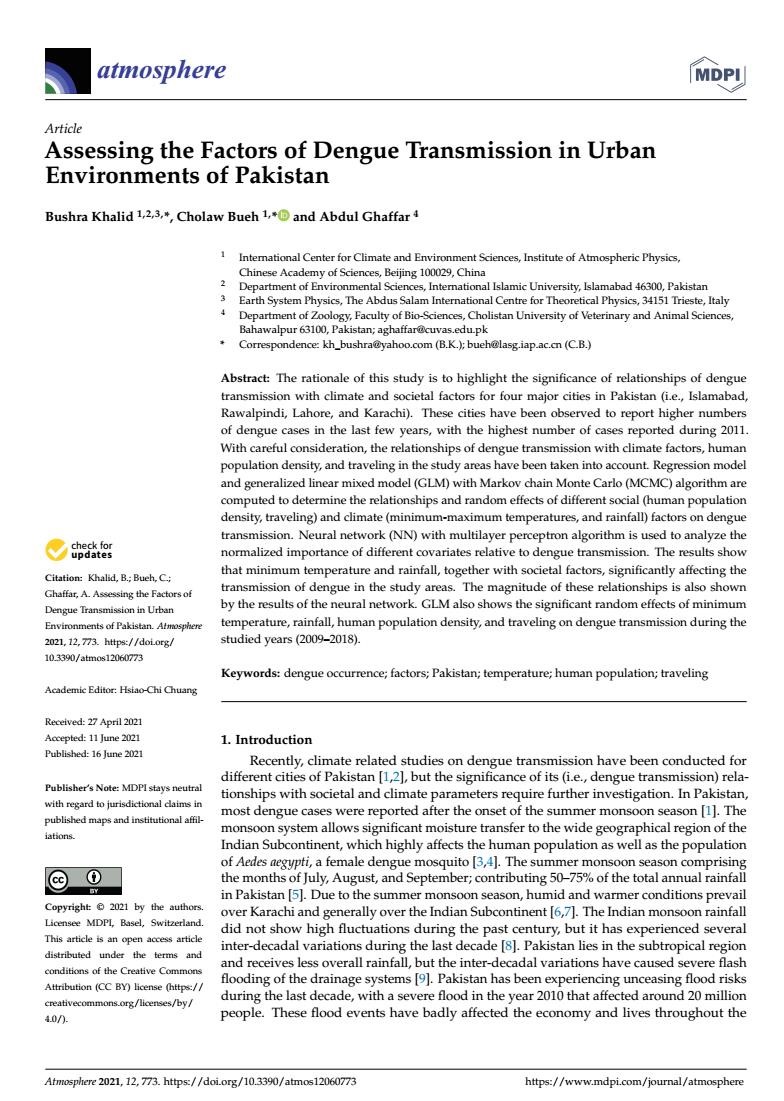In a paper co-published with Prof. Cholaw Bueh. Dr. Busha Khalid, a graduate of CAS-TWAS Center of Excellence for Climate and Environment Sciences, assessed the factors of dengue transmission in urban environments in Pakistan, and the study revealed the importance of the link between dengue transmission and climate and social factors in four major cities in Pakistan (Islamabad, Rawalpindi, Lahore and Karachi). These cities have been observed to have reported higher numbers of dengue cases in the past few years, with the highest number reported in 2011. After careful investigation, they have mainly considered the relationship between dengue transmission and climate factors, population density and tourism activities in the study area. The random effects of dengue transmission were determined by regression models and a broad linear hybrid model (GLM) containing the Markov Chain Monte Carlo (MCMC) algorithm to determine the random effects of different social (population density, travel) and climate (minimum maximum temperature and rainfall) factors on dengue transmission. At the same time, they also used multi-layered perceptron neural network (NN) algorithm to analyze the importance of different covariates for dengue transmission. Studies have shown that minimum temperatures and rainfall, as well as social factors, have a significant impact on the spread of dengue fever in the study area. This study provides important factual basis and technical support for understanding and understanding the mechanism of dengue disease transmission in countries and regions in tropical and subtropical monsoon regions, and is instructive for the prevention of dengue infectious diseases.

Dr. Bushra Khalid has been working with Prof. Cholow Bueh on the impact of climate change on the spread of disease since 2015. During her visit, she focused on the transmission characteristics of dengue fever in Pakistan between 2009 and 2012, using linear regression and neural networks to reveal the effects of weather conditions (highest summer days, minimum temperatures, precipitation) and social factors (population, number of tourists) on dengue transmission in different cities, and the study provided an important basis for establishing early warning of dengue fever in Pakistan; In addition, she analysed the energy exchange parameters and their changes in the Margalla National Park area of Islamabad, which is of reference value to the water collection process in the area; The forecasting ability of ECMWF and UKMO sea gas coupling model for winter low temperature events in Pakistan is also evaluated, which is of reference value to winter low temperature forecast.
Bushra Khalid is the first female Ph.D. in meteorology in Pakistan and she was interviewed by The New York Times about her research (dengue transmission) and received the inaugural Gro Brundtland Award (5 per year) on February 26, 2016, for her contributions to public health and sustainable development research in Asia as a young female scientist.